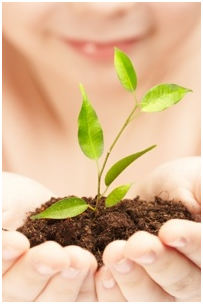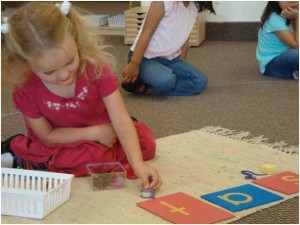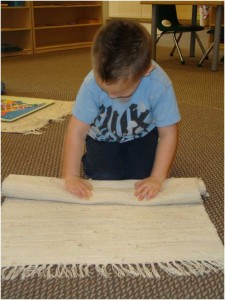Infant
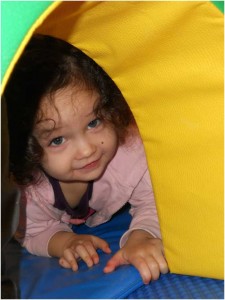 The Infant Program cares for children ages 4 months - 18 months. With a ratio of 1 adult to four infants, our teachers are there for every crawl, step and tumble. In the Infant Center we primarily focus on meeting the daily needs of our infants. Together, we build the trust and emotional security that comes when infants learn that these needs are met through daily interaction with responsive, affectionate adults. This crucial relationship between child and teacher lays the foundation for farther development of language, motor and self-help skills.
The Infant Program cares for children ages 4 months - 18 months. With a ratio of 1 adult to four infants, our teachers are there for every crawl, step and tumble. In the Infant Center we primarily focus on meeting the daily needs of our infants. Together, we build the trust and emotional security that comes when infants learn that these needs are met through daily interaction with responsive, affectionate adults. This crucial relationship between child and teacher lays the foundation for farther development of language, motor and self-help skills.
Our Infant Center is a well designed environment prepared entirely for the discovery of our youngest students. MFM provides a nurturing and secure environment where young children can do what they do best, explore everything! At this age, children interact with the world through tactile and visual stimulation. The prepared classroom is characterized by order, simplicity and beauty; it is set up as a padded play area to allow for unrestrictive movement. Special attention is given to the development of expressive and comprehensive language skills. Teachers reinforce understanding by combining words, tone, inflection and body language.
Our infants enjoy a full program of age-appropriate activities such as exploring the specially prepared environment, reading books, playing music, having tummy time and snuggle time, are all part of our routine. The daily parent communication sheet informs you of your child’s feeding, sleeping and diaper changing schedule, as well as any special activities or milestones that occurred that day. Weather permitting, our infants are taken outside twice daily onto a fully covered play area for fresh air and exercise.
Toddler / Transitional
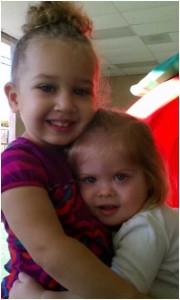 A toddler/transitional is a child 18 to 36 months old, in transition between babyhood and the preschool years. During these sensitive years, young children assimilate and process their own balance of physical, cognitive, social, and emotional stimulation from the world around them. The child in the Toddler Program begins literally to step out into his or her first experience beyond the family. Most often, this is the child’s first opportunity to interact with other children similar in age; through the social community of peers, the child begins to understand the importance of cooperation and assertiveness. The structure of the curriculum is based on five developmental areas: Sensory and Perception, Physical and Motor, Self-Help Skills, Language, Social and Emotional.
A toddler/transitional is a child 18 to 36 months old, in transition between babyhood and the preschool years. During these sensitive years, young children assimilate and process their own balance of physical, cognitive, social, and emotional stimulation from the world around them. The child in the Toddler Program begins literally to step out into his or her first experience beyond the family. Most often, this is the child’s first opportunity to interact with other children similar in age; through the social community of peers, the child begins to understand the importance of cooperation and assertiveness. The structure of the curriculum is based on five developmental areas: Sensory and Perception, Physical and Motor, Self-Help Skills, Language, Social and Emotional.
Toddlers go through a time of tremendous growth with unique needs and abilities that can be well met by the Montessori classroom. Toddlers enjoy freedom of movement and choice to explore the specially prepared environment tailored to their size and abilities. The children alternate between group and individual learning times throughout the day. Group time may include a story, art, music or introduction of a new concept. Individual time can be spent in the library area, practical life and dramatic play areas or choosing a puzzle or another learning material from one of the shelves. Everything in the environment is designed to be safe and aesthetically pleasing - appealing to the child's natural curiosity. Lower fixtures in the lavatory help with toilet training, which is a vital developmental milestone our teachers will be assisting your child with in the class.
The Toddler environment is a secure and nurturing place for the children to begin what Montessori referred to as their "education for life.” The materials are specially chosen and presented to allow them to successfully "do", fostering their independence, confidence and concentration. In the toddler program, practical life activities are particularly emphasized as they give children the chance to develop skills to care for themselves and their environment. Toddlers are given as many opportunities as possible to do things for themselves in all aspects of their day. The activities allow toddlers to experience the concepts of sequence, form, shape, movement and sound, and will change and evolve as the child grows physically, emotionally and intellectually.
Pre-K
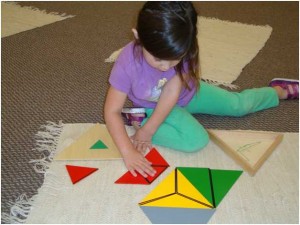 The Pre-K, 2.9 to 5 year old child has an extraordinary capacity to absorb substantial information from his or her surroundings. At the Pre-K level, the focus is on developing the building blocks for learning. The well rounded program strengthens the child’s intellectual, cognitive, social, creative and emotional skill set and prepares the students for education beyond MFM. The enriched classroom environment allows the child to work independently and cooperatively, building upon concrete ideas with more abstract principals. The product of this creative, child-centered community is individuals who are self-motivated, confident and academically accelerated.
The Pre-K, 2.9 to 5 year old child has an extraordinary capacity to absorb substantial information from his or her surroundings. At the Pre-K level, the focus is on developing the building blocks for learning. The well rounded program strengthens the child’s intellectual, cognitive, social, creative and emotional skill set and prepares the students for education beyond MFM. The enriched classroom environment allows the child to work independently and cooperatively, building upon concrete ideas with more abstract principals. The product of this creative, child-centered community is individuals who are self-motivated, confident and academically accelerated.
The Montessori environment is designed to support children's natural interests and propensity for learning at their own pace and readiness. A wealth of materials preparing each child for future academic success is found in each classroom. Beautiful and lovingly created work invites your child to make discoveries in:
- Botany
- Zoology
- Geography
- History
- Language, including Spanish
- Mathematics
- Geometry
- Global Awareness
A phonetic pre-reading and writing curriculum encourages students to begin reading books at age three or four. Our teachers track the students’ progress daily and guide them through the progressively challenging materials.
K - 3rd Grade
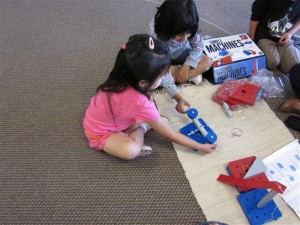 Kindergarten and Third Grade years provide an explosion into learning and maturity. The Kindergarten year is a critical component of the three-year Early Childhood Montessori program. This is the year when children's earlier experiences are internalized and reinforced. The child learns to develop responsibility and time management in their work cycle. The Kindergarten year is a time to strengthen aptitude in reading and mathematics. From Kindergarten through their First Grade year they begin to apply these critical skills in more advanced studies of math, science, language, cultural, and the arts.
Kindergarten and Third Grade years provide an explosion into learning and maturity. The Kindergarten year is a critical component of the three-year Early Childhood Montessori program. This is the year when children's earlier experiences are internalized and reinforced. The child learns to develop responsibility and time management in their work cycle. The Kindergarten year is a time to strengthen aptitude in reading and mathematics. From Kindergarten through their First Grade year they begin to apply these critical skills in more advanced studies of math, science, language, cultural, and the arts.
The busy K-3 class is challenging, stimulating and fun. Mathematics is presented through three dimensional, manipulative materials that support arithmetic, geometric, and algebraic correlations. The grammar materials use symbols and visual patterns to help the child understand parts of speech and analyze the structure, style, and logic of sentences. Classroom scales teach weight and measurement, microscopes reveal a whole other dimension to our everyday life, and maps and globes provide the launching pad for student research about the diverse world we live in.
The lower elementary environment gives the childhood imagination free realm to extend the educational materials beyond the boundaries of the classroom work table. At MFM, our “Knowledge at Work” approach gives our students the tools to integrate what they have learned in the classroom with practical and socially relevant applications. For example, when teaching about Africa, students are not only given the geographical lesson, but they are farther engaged in their studies on the history, culture, literature and current events significant in the region. Our goal is to encourage children to take that extra step in the logical thought process to broaden their understanding. The children in essence learn how to learn: How to gather, process, interpret, and ultimately formulate their own comprehension of the people, places and issues that make up our global community.
Enrichment
![viewer[6]](http://myfirstmontessori.com/wp-content/uploads/2011/02/viewer6-231x300.png) Visual arts, music, foreign language, technology, gardening and physical education are integral components of the discovery process from the early childhood through lower elementary classrooms. Each week, children are exposed to age-appropriate activities that enhance their learning experience in the classroom. Our goal is to create a well-rounded, comprehensive program with a more contemporary approach to a child's overall development.
Visual arts, music, foreign language, technology, gardening and physical education are integral components of the discovery process from the early childhood through lower elementary classrooms. Each week, children are exposed to age-appropriate activities that enhance their learning experience in the classroom. Our goal is to create a well-rounded, comprehensive program with a more contemporary approach to a child's overall development.
My First Montessori’s Integrated Arts Program arises from each classroom’s cultural and science curriculum, with lessons intentionally designed and carefully developed to integrate the arts into the students’ work. The Arts Coordinator is responsible for working closely with our teachers to incorporate the weekly theme into her group lessons and provide materials for the work shelves in each classroom. Furthermore, the child may utilize art in such things as geometrical drawings, geographical maps, mathematical graphing, or illustrations for history, botany, zoology, social studies, geology, geography, etc. A variety of techniques are taught, and with multiple media available at their disposal, the child has free artistic expression in a Montessori environment. Collaborative projects and large-scale murals also provide opportunities for children to work and brainstorm together.
The Music Program at MFM gives children the opportunity to experience music every day in the classroom through singing and studies of various composers. Our Music Instructor provides formal group lessons with the children once a week. A different musical instrument is introduced each week alongside music theory and language (notation, rhythm, harmony, musical literature). The engaging class gives children a positive first experience to musical appreciation through song, movement and laughter. The children also share their joy of music in our school-wide winter and spring performances.
Our Music Instructor offers private lessons to interested families. With a baby grand piano on campus, the children receive convenient, individual instruction on the piano, guitar or flute to children as young as three. This is an optional program and an additional fee will apply.
Foreign Language in Spanish is assimilated into the curriculum through formal instruction and exposure to supplemental manipulatives. Research has shown that the younger a child is when he/she is exposed to a new language; the more achievable it will be for the acquisition of the language. Beginning with the Transitional age group, half an hour is dedicated to Spanish instruction in the classroom each week. Spanish materials and songs are continually presented to the children to reinforce these lessons throughout the week.
Technology is an increasingly important tool in our everyday life. In order to equip our students with the necessary skills they need to navigate the Information Age, we have converted an entire wing of the atrium into a media center, with a full library and computer lab. Our Information Technology Instructor will be familiarizing students with using the computer, searching on the internet and finding the exact book that they need from collection of 5000 books. The resources of the media center will serve as an extension to the classroom: To assist in building skills in writing, research and word processing, to teach keyboard proficiency and to reinforce concepts learned in the Montessori classroom. The center is particularly beneficial for students who have visual motor and/or organizational difficulties and do not respond as well to the conventional approaches. Educational software and research based projects provide ample opportunities for children to use the different work stations in the center throughout the week.
The children participate in gardening during the spring and summer seasons. The fruit and vegetable gardens provide a rich and rewarding way to learn about environmental science. Children are engaged in the crop cycle from start to finish. They receive hands-on lessons about soil composition, preparation of soil, crop rotation, sowing, transplanting, growing, and harvesting. Harvesting the fruits of their labor encourages the children to try different foods from the garden.
Students are encouraged to participate in physical education as a step towards developing a lifelong appreciation for exercise and physical fitness. A great outlet for their energy, athletics can improve a child’s sense of self through physical achievement. We concentrate on the fundamental movements of jumping, skipping, leaping, galloping, and sliding skills through fun games, relays and activities. Our P.E teacher introduces gross motor techniques to the children on a weekly basis such as throwing, catching, rolling, bouncing, and kicking.
